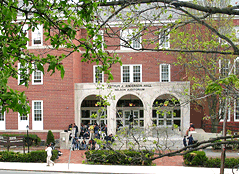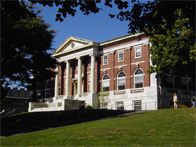Introduction
Founded in 1852, Tufts University has grown from a small, regional college to a worldrenowned, major research university whose 5,000 undergraduates come from more than sixtyfive countries. Regardless of where they are from, Tufts students, staff, and faculty all share the common goal of using their intellects to better the world, whether it is working in rural Ghana to stop the spread of parasitic diseases found in local water sources or volunteering in Boston as translators for recent Vietnamese immigrants.
A Tufts education will inspire [you] to get out into the world and shake things up, tear things down, and make things better. —Kyle Halle-Erbe, ’10
Referred to by President Larry Bacow as a small university with a sense of intimacy, Tufts nurtures the development of global scholars and leaders by combining the best aspects of small liberal arts colleges—discussion and inquiry-based classes; close relationships with professors—and the best attributes of large research universities—funding and support for undergraduate research; award-winning, internationally recognized faculty. Emphasizing the importance of intellectual exploration and interdisciplinary education, Tufts fosters the growth of poetry-writing engineers, political activist premed students, and environmentally conscious entrepreneurs. Although students are enrolled in either the school of engineering or the school of liberal arts, classes in each school are open to all undergraduates.
Undergraduate students also benefit from the resources and research opportunities available at Tufts’ eight graduate schools, including the School of Medicine, School of Dental Medicine, School of Veterinary Medicine, Nutrition School, and Fletcher School of Law and Diplomacy, the nation’s oldest and arguably most prestigious graduate school in international relations. A national leader in active citizenship, Tufts is home to the Jonathan M. Tisch College of Citizenship and Public Service. In May 2006, six years after its founding, Tufts alumnus Jonathan M. Tisch’s generous $40 million endowment gift ensured the college’s future as a university fixture. Integrating active citizenship into the curriculum, Tisch College facilitates collaboration between civic-minded students and faculty who aspire to solve complex real-world problems. Recent student-initiated projects include biomedical engineers utilizing light spectroscopy for breast cancer screening and studio art students examining art and social change as reflected through graffiti.
Located just five miles northwest of Boston, Tufts’ beautiful 150-acre New England college campus rests upon Walnut Hill and overlooks the city skyline. The campus is a short walk or shuttle bus ride from Davis Square, a bustling social center that is home to independent coffee shops, live music venues, delicious ethnic food, and one of Boston’s best used-bookstores. Davis Square, located on the Red Line of the subway, also provides students with easy access into Boston, where students often grab dinner in the North End (Boston’s “Little Italy”), visit the Museum of Fine Arts (where Tufts students receive free admission), or catch a Red Sox or Celtics game.
Although students appreciate Boston’s accessibility, the heart of undergraduate life is found on campus, home to 5,000 students and over 200 thriving student-run organizations. Students who live on campus have the option of choosing between single-sex and coed dormitories, on-campus apartments, fraternity and sorority houses, and numerous culture units, including the Africana, Latino, Asian American, International, Jewish, Muslim, Spanish, French, German, Russian, Arts, Crafts, and Substance Free Culture Units. All first- and secondyear students are required to live on campus; many third- and fourth-year students choose to live with friends in off-campus apartments immediately surrounding the university.
Construction vehicles and hard hats have been a common site on campus recently. Two major construction projects were recently completed. Sophia Gordon Hall, an environmentally friendly “green” dormitory that houses 125 seniors, opened its doors in the fall of 2006. The university’s new music building, home to the music department and a new 300-seat, acoustically engineered, recording-quality auditorium, was completed in January of 2007. Other campus improvements within the past couple of years include the construction of a $2 million boathouse on the Malden River for Tufts’ crew teams, the renovation of West Hall, a residence hall since 1872 that is a favorite amongst students and known for its spacious rooms and prime location on the academic quad, and the revamping of Cabot Auditorium and the Fletcher School of Law and Diplomacy.
Tufts is an eclectic and dynamic community of passionate students from a wide variety of geographic, racial, ethnic, socioeconomic, religious, and cultural backgrounds. Students of color and international students make up more than a third of the undergraduate study body. It is not unusual for a first-year student from Chicago to be roommates with a student from Seattle and neighbors with a student from Hong Kong and a student from Texas. The diversity within the undergraduate student body creates a stimulating, intellectual community in which students are constantly learning in the classrooms from their first-rate professors and outside the classroom from their eclectic classmates.
Most students are drawn to Tufts because they are looking for a challenge—both inside and outside of the classroom. Tufts provides students with a high-quality education where the learning extends far beyond the walls of the classroom. Tufts students appreciate the diverse student body, beautiful campus, access to a major city, and community in which students take their academics seriously, yet lead healthy and balanced lives.
Originally from the small, rural town of Schulenburg, Texas, Michelle Eilers, ’10, chose Tufts because she wanted to attend a school where students learned just as much from their peers during political debates in the dining hall and late-night discussions about global dilemmas in the dorms as they did from their professors. She wrote, “I want to meet people with whom I have nothing in common and argue about values and beliefs. I want to interact with people involved in making real world contributions, because I want to make meaningful contributions of my own.” In Tufts, Michelle and many other like-minded students have found a perfect match.
Unlike many other prestigious universities, Tufts is a dynamic and innovative institution of higher learning whose president, professors, and students use academic and social capital to make tangible differences in the world. Under the leadership of President Larry Bacow, the university has heightened an already impressive academic profile by attracting top-notch students and faculty. Robert Sternberg, former president of the American Psychological Association and one of the world’s foremost experts on the topics of creativity and intelligence, assumed the position of Dean of Arts and Sciences in 2005. Linda Abriola, a member of the National Academy of Engineering and a universally recognized specialist in water allocation and water resources, became one of the few female Deans of Engineering in the country when she accepted that position in 2004.
Scholars and students alike recognize that Tufts is a special school—a university on the forefront of both research and teaching, a campus defined by intellectual curiosity and handson learning, and a community of scholars and leaders who want to “shake things up, tear things down, and make things better.”

